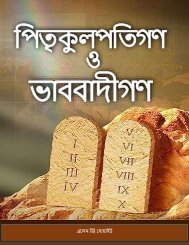Finishing the Race
Of all the games instituted among the Greeks and the Romans, the races were the most ancient and the most highly esteemed … The contests were governed by strict regulations, from which there was no appeal. Those who desired their names entered as competitors for the prize had first to undergo a severe preparatory training. Harmful indulgence of appetite, or any other gratification that would lower mental or physical vigour, was strictly forbidden. For one to have any hope of success in these trials of strength and speed, the muscles must be strong and supple, and the nerves well under control. Every movement must be certain, every step swift and unswerving; the physical powers must reach the highest mark.
Of all the games instituted among the Greeks and the Romans, the races were the most ancient and the most highly esteemed … The contests were governed by strict regulations, from which there was no appeal. Those who desired their names entered as competitors for the prize had first to undergo a severe preparatory training. Harmful indulgence of appetite, or any other gratification that would lower mental or physical vigour, was strictly forbidden. For one to have any hope of success in these trials of strength and speed, the muscles must be strong and supple, and the nerves well under control. Every movement must be certain, every step swift and unswerving; the physical powers must reach the highest mark.
Create successful ePaper yourself
Turn your PDF publications into a flip-book with our unique Google optimized e-Paper software.
The rage of <strong>the</strong> persecutors was equalled by <strong>the</strong> faith of <strong>the</strong> martyrs. Not only men but<br />
delicate women and young maidens displayed unflinching courage. "Wives would take <strong>the</strong>ir<br />
stand by <strong>the</strong>ir husband's stake, and while he was enduring <strong>the</strong> fire <strong>the</strong>y would whisper words<br />
of solace, or sing psalms to cheer him." "Young maidens would lie down in <strong>the</strong>ir living<br />
grave as if <strong>the</strong>y were entering into <strong>the</strong>ir chamber of nightly sleep; or go forth to <strong>the</strong> scaffold<br />
and <strong>the</strong> fire, dressed in <strong>the</strong>ir best apparel, as if <strong>the</strong>y were going to <strong>the</strong>ir marriage."-- Ibid., b.<br />
18, ch. 6.<br />
As in <strong>the</strong> days when paganism sought to destroy <strong>the</strong> gospel, <strong>the</strong> blood of <strong>the</strong> Christians<br />
was seed. (See Tertullian, Apology, paragraph 50.) Persecution served to increase <strong>the</strong><br />
number of witnesses for <strong>the</strong> truth. Year after year <strong>the</strong> monarch, stung to madness by <strong>the</strong><br />
unconquerable determination of <strong>the</strong> people, urged on his cruel work; but in vain. Under <strong>the</strong><br />
noble William of Orange <strong>the</strong> Revolution at last brought to Holland freedom to worship God.<br />
In <strong>the</strong> mountains of Piedmont, on <strong>the</strong> plains of France and <strong>the</strong> shores of Holland, <strong>the</strong><br />
progress of <strong>the</strong> gospel was marked with <strong>the</strong> blood of its disciples. But in <strong>the</strong> countries of <strong>the</strong><br />
North it found a peaceful entrance. Students at Wittenberg, returning to <strong>the</strong>ir homes, carried<br />
<strong>the</strong> reformed faith to Scandinavia. The publication of Lu<strong>the</strong>r's writings also spread <strong>the</strong> light.<br />
The simple, hardy people of <strong>the</strong> North turned from <strong>the</strong> corruption, <strong>the</strong> pomp, and <strong>the</strong><br />
superstitions of Rome, to welcome <strong>the</strong> purity, <strong>the</strong> simplicity, and <strong>the</strong> life-giving truths of <strong>the</strong><br />
Bible.<br />
Tausen, "<strong>the</strong> Reformer of Denmark," was a peasant's son. The boy early gave evidence<br />
of vigourous intellect; he thirsted for an education; but this was denied him by <strong>the</strong><br />
circumstances of his parents, and he entered a cloister. Here <strong>the</strong> purity of his life, toge<strong>the</strong>r<br />
with his diligence and fidelity, won <strong>the</strong> favour of his superior. Examination showed him to<br />
possess talent that promised at some future day good service to <strong>the</strong> church. It was<br />
determined to give him an education at some one of <strong>the</strong> universities of Germany or <strong>the</strong><br />
Ne<strong>the</strong>rlands. The young student was granted permission to choose a school for himself, with<br />
one proviso, that he must not go to Wittenberg. The scholar of <strong>the</strong> church was not to be<br />
endangered by <strong>the</strong> poison of heresy. So said <strong>the</strong> friars.<br />
Tausen went to Cologne, which was <strong>the</strong>n, as now, one of <strong>the</strong> strongholds of Romanism.<br />
Here he soon became disgusted with <strong>the</strong> mysticisms of <strong>the</strong> schoolmen. About <strong>the</strong> same time<br />
he obtained Lu<strong>the</strong>r's writings. He read <strong>the</strong>m with wonder and delight, and greatly desired to<br />
enjoy <strong>the</strong> personal instruction of <strong>the</strong> Reformer. But to do so he must risk giving offense to<br />
his monastic superior and forfeiting his support. His decision was soon made, and erelong<br />
he was enrolled as a student at Wittenberg.<br />
On returning to Denmark, he again repaired to his cloister. No one as yet suspected him<br />
of Lu<strong>the</strong>ranism; he did not reveal his secret, but endeavoured, without exciting <strong>the</strong><br />
prejudices of his companions, to lead <strong>the</strong>m to a purer faith and a holier life. He opened <strong>the</strong><br />
Bible, and explained its true meaning, and at last preached Christ to <strong>the</strong>m as <strong>the</strong> sinner's<br />
righteousness and his only hope of salvation. Great was <strong>the</strong> wrath of <strong>the</strong> prior, who had built<br />
146


















